Pegasus Ride Ltd: Unmasking a Ponzi Scheme
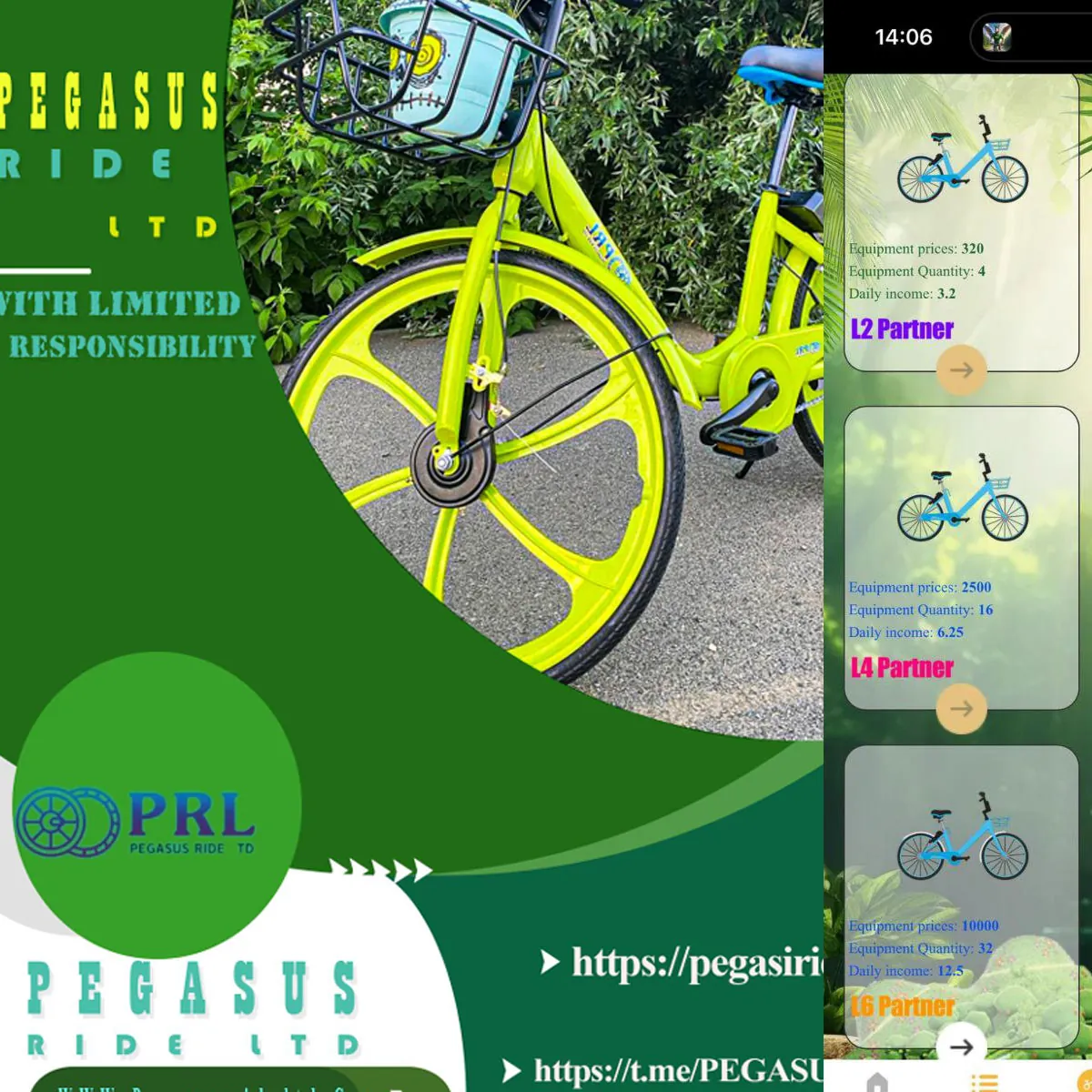
Introduction
Pegasus Ride Ltd, a company claiming to be a leader in the global bicycle-sharing and mobility industry, presents itself with lofty promises of environmental impact, advanced technology, and lucrative job creation. With claims of having placed millions of bicycles across cities worldwide and promoting green, low-carbon travel, Pegasus Ride appears legitimate and even socially responsible. However, this façade hides a carefully constructed Ponzi scheme targeting unsuspecting investors with promises of unsustainable financial returns.
Despite the company’s public claims, a deeper investigation reveals that Pegasus Ride Ltd is a newly registered company, using a virtual office in the UK, and its supposed achievements are largely unsubstantiated. This article delves into the company’s tactics, structure, and the red flags that point toward a scam, aiming to alert potential investors and prevent further losses.
Company Overview and Green Claims
Pegasus Ride Ltd markets itself as a “global leader” in the shared mobility industry, boasting impressive statistics:
- 47.1 billion kilometers traveled, reducing 2.22 million tons of carbon emissions.
- An active fleet of over 15 million bikes in 500 cities worldwide, with 30 million orders per day.
- Claims of creating nearly 400,000 jobs and promoting environmental sustainability equivalent to planting millions of trees.
The company emphasizes a vision of low-carbon travel and social responsibility. They leverage these claims to build credibility, appealing to eco-conscious investors who want to support green initiatives. However, such claims lack independent verification, and the data presented seems implausible for a new company with no substantial operational history.
Dubious Operations and Red Flags
- New and Unproven Website: Pegasus Ride Ltd’s website first appeared online in June 2024, suggesting it is a recent creation. Despite this, the company makes sweeping claims about years of operational success and global reach. The lack of a digital footprint or historical records before mid-2024 raises serious questions about its authenticity.
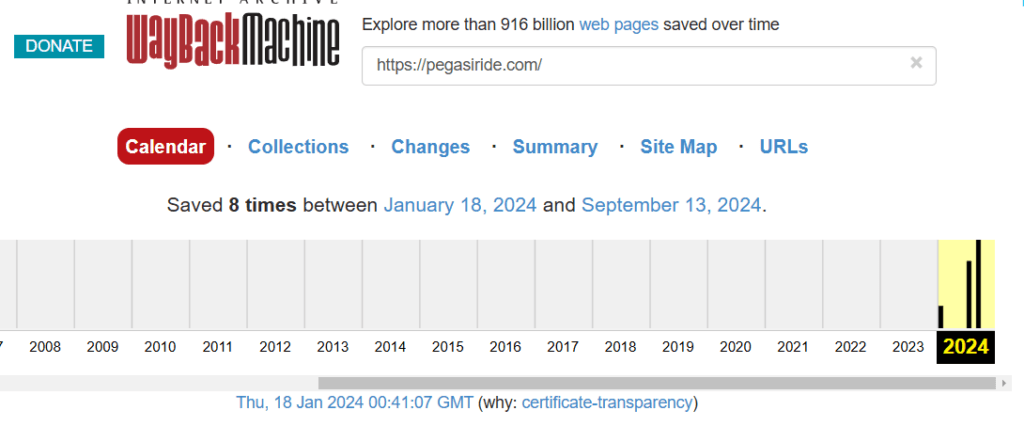
- Virtual Office and Hidden Ownership: The UK address listed for Pegasus Ride Ltd is a virtual office, a tactic frequently used by scam operations to appear legitimate without establishing a physical presence. The real identity of the business owner remains hidden, with Shahadat Hossain listed as the only director. This opacity around ownership and the use of a virtual office are common red flags associated with fraudulent schemes.
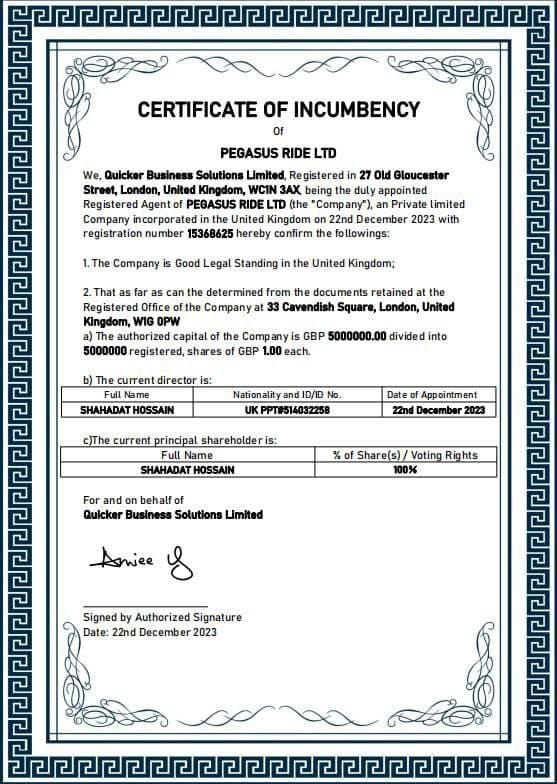
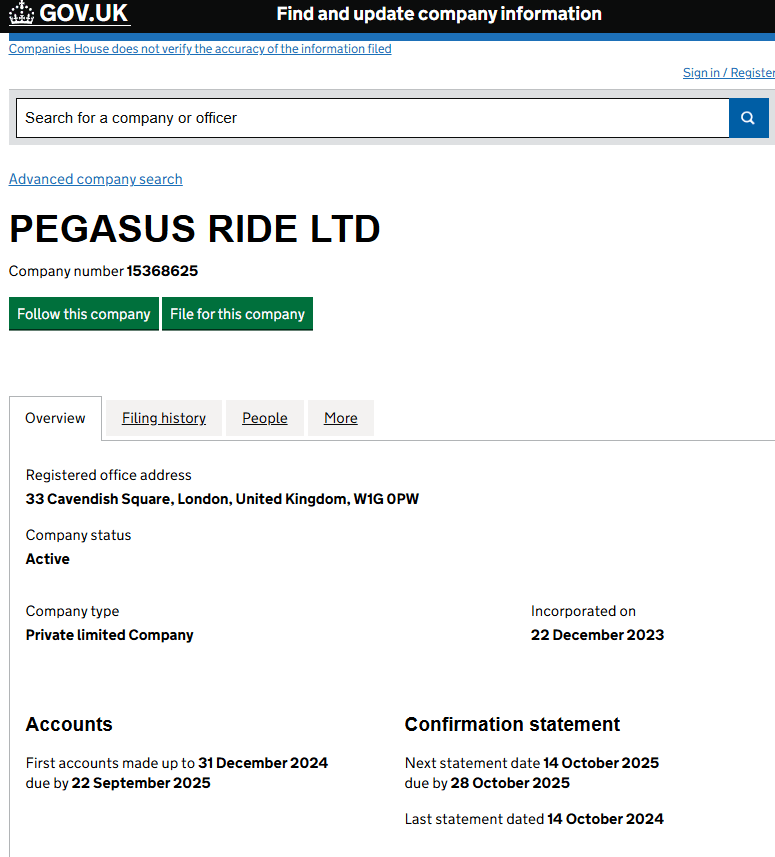
- Unrealistic Growth and Job Creation Claims: Pegasus Ride Ltd’s claims of providing more than 15 million shared bicycles globally, with 30 million daily orders, would position it as one of the largest mobility companies in the world—surpassing even established players like Lime and Mobike. Similarly, claims of creating hundreds of thousands of jobs lack any supporting evidence or real-world corroboration. For a company with such alleged reach, the absence of media coverage, independent reporting, or market presence is highly suspicious.
- Social Media Manipulation: Pegasus Ride Ltd’s social media presence is carefully crafted, featuring images of smiling individuals, group events, and “happy” users purportedly enjoying the benefits of the service. These staged photos serve to lure new investors by creating a positive, trustworthy image. Additionally, the company encourages testimonials and social media sharing, a tactic often used in pyramid schemes to create a facade of legitimacy and attract new recruits.
- Ponzi Structure in Investment Plans: Investors are offered multiple “levels” of investment, with each level requiring a larger sum but promising significantly higher returns. For instance, investments range from $320 to $20,000, with daily returns claimed to be as high as $620. This structure is a hallmark of Ponzi schemes, where early investors are paid from the funds of new investors, not from actual revenue generated by the business.

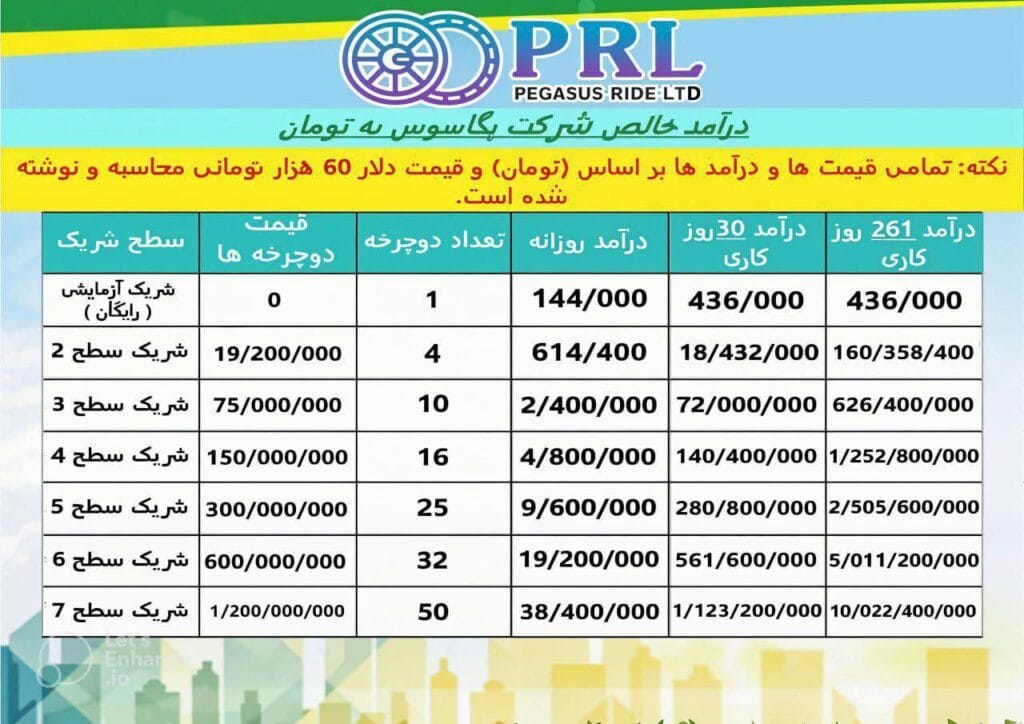
- Recruitment Bonuses and Pyramid-Like Incentives: Pegasus Ride Ltd incentivizes investors to recruit others, offering bonuses based on the level of investment their recruits make. This pyramid-style recruitment model further indicates a Ponzi scheme, as the company’s revenue depends on the constant inflow of new participants rather than any real business operations.
- Withdrawal Barriers and Fees: The company charges a steep 20% fee for withdrawals, purportedly to cover platform maintenance, development costs, and other expenses. Such high fees are commonly employed in scams to dissuade withdrawals, keeping investor funds locked in the system for as long as possible.
Deceptive Marketing Tactics
Pegasus Ride Ltd’s website and marketing materials heavily emphasize environmental and social responsibility, exploiting the appeal of green initiatives. They use buzzwords like “carbon emission reduction,” “inclusive living services,” and “low-carbon travel” to create an image of a socially conscious company. However, no evidence supports these claims, and it is highly likely that these statements are designed solely to attract eco-conscious investors without any real-world actions to back them up.
The company’s presentation mimics established brands in the shared economy, such as “Hellobike” and “Mobike.” By aligning with recognized industry themes, they aim to gain trust and legitimacy. Yet, Pegasus Ride Ltd’s structure and operations lack the transparency, accountability, and operational proofs that legitimate companies in this sector provide.
The Social Media Trap
Social media plays a central role in Pegasus Ride Ltd’s strategy to attract and retain investors. Happy faces, celebratory events, and testimonials flood their profiles, creating a vibrant community appearance. This illusion is critical in convincing new investors that they are joining a thriving, supportive network.
The company’s messaging promotes a “win-win cooperation” and encourages investors to report any negative experiences with staff. This tactic aims to reassure potential investors by giving the impression of a transparent, well-managed organization. However, it is more likely a superficial measure to mitigate suspicions, while negative comments or complaints are filtered or ignored.








ScamMinder
Pegasus Ride Ltd shows multiple warning signs of a potential scam, with exaggerated claims and questionable practices. To protect yourself from such online schemes, use ScamMinder’s website analysis tool at ScamMinder for a detailed review. ScamMinder’s platform helps users identify and avoid risky websites, offering real-time scam scores to ensure a safer online experience.
Final Warning to Investors
The evidence overwhelmingly indicates that Pegasus Ride Ltd is operating a Ponzi scheme. The lack of physical presence, unrealistic claims of scale and growth, reliance on new investments, and the heavy emphasis on recruitment bonuses all point to a classic pyramid scheme structure. Investors should be wary of such grandiose claims, especially from a company with virtually no verifiable history or operations.
Investing in Pegasus Ride Ltd poses a high risk of financial loss, as the scheme will inevitably collapse once new investor funds dry up. Those who join early may receive payouts initially, giving a false sense of security, but the majority of investors, especially latecomers, are likely to lose their investments entirely. Moreover, involvement in promoting or recruiting others into such schemes can have legal consequences, as authorities worldwide are increasingly targeting Ponzi schemes and MLM scams.
Conclusion
Pegasus Ride Ltd is a carefully constructed scam, using the guise of green mobility and shared economy ideals to lure in investors. The company’s claims of environmental impact, job creation, and global reach are almost certainly fabricated to create a facade of legitimacy. Potential investors are advised to stay clear of Pegasus Ride Ltd and report any suspicious activity to the relevant authorities. By raising awareness of such schemes, we can help protect more individuals from falling victim to these fraudulent operations.





It finally went into scam phase at december second. The real scammers are public domain website who sell domains to them and when i reported the website they said there is no evidence of scam. Domain sellers are scammers too. they should give up scammers names and ids.